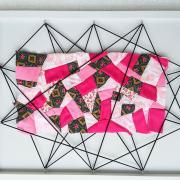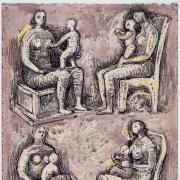We begin a new series inviting readers to tell us about their unusual place of work
I’m surrounded by art every day which, for me, is just HORRIBLE. Bear with me. I’ll explain. There was a priest in medieval times who was incarcerated by his archbishop for embezzling church funds. The archbishop asked him: ‘What’s your favourite meal?’ And the priest said: ‘Partridge. I love it!’ So the archbishop saw to it that, during his time in prison, he ate partridge – and only partridge – every single day. After 10 years he came back to see the priest who, by this time, was completely miserable. The archbishop asked him: ‘How are you getting on?’ And the priest replied: ‘Too much partridge.’ That’s how I feel. Well, that’s not wholly true, of course.
Dean Clough is a collection of 19th century mills in Halifax that was once the world’s largest carpet factory. In the 1980s a regeneration programme began to turn it into the arts and business complex it is today. What makes it unusual – unique, in fact – is the sheer size of the place. We’re spread over 20 acres. There are other mill developments that mix art and business, but not on our scale. To put it in perspective, 4,000 people work here and 150 businesses are based here from banks and insurance companies to the theatre companies IOU and Northern Broadsides. We also have 24 artists’ studios, six art galleries and a theatre, and we put on performance events such as jazz evenings, poetry readings and comedy nights. If this was just a boring business park it would be bland – and at the weekend it would die. Here, though, the atmosphere is completely different.
Obviously I’m on the panel that selects and stages the gallery exhibitions. I’d like to think we value quality and enthusiasm more than renowned. We’re certainly not dogmatic. Whatever else art does, it should remind people they’re alive and make them think about the world in which they live.
Why have we always had artists in residence and art galleries here? Well, partly for idealistic reasons. Dean Clough’s founder, Ernest Hall, was a big supporter of the arts – and so is his son, Jeremy, who is now chairman and managing director. They’re both musicians and their commitment and passion is genuine. At the same time, art has played an important commercial function at Dean Clough. I don’t think it’s too cynical to say that it brought attention to the place, because viewing art in an old mill seemed like a really unusual thing to do back in the 1980s.
All the mills at Dean Clough are now pretty much renovated and have businesses based in them. We’re also becoming something of an urban village with cafes, restaurants, gyms, hairdressers and a Jack Wills outlet. But it means there’s a danger that the artists who work here could start to be squeezed out and, culturally, that would be a major loss. In order to stop that happening, the charity I run – called the Arts Charity at Dean Clough, or ACDC – is now in charge of turning Fletchers Mill, one of the last un-renovated spaces, into a building that will specifically be used to house artists’ studios. That’s what we’re doing right now and some have already moved in.
There’s art in the corridors as well as the galleries. It gives the people who work here a sense of ownership. Hopefully it ‘reminds them they’re alive’ but at the very least it’s useful for directing visitors. ‘To get to our office,’ they might say, ‘drive past the giant aluminum sheep by Frank Darnley, park near Lawrence Weiner’s postmodern weighbridge, walk up the stairs to Olivia Brown’s vulture – and our office is next to Ray Fearn’s Nazi orgy.’
Vic Allen, executive director of ACDC, the arts charity at Halifax-based business and arts complex Dean Clough, was talking to Tony Greenway.



























